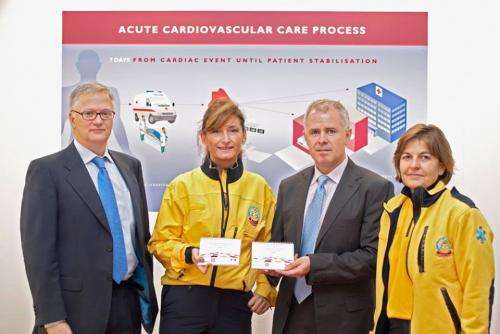First aid teams set to improve heart attack survival with pocket manual

30 October 2013: First aid teams are set to improve the survival of heart attack patients with the first pocket-sized manual on acute cardiac conditions. The toolkit was created by expert members of the Acute Cardiovascular Care Association (ACCA) of the European Society of Cardiology (ESC) to help first aid teams across Europe make the best decisions in seconds after a heart attack.
The Acute Cardiovascular Care Association Clinical Decision-Making Toolkit is available here http://www.escardio.org/communities/ACCA/education-research/awareness/Pages/toolkit.aspx
Dr Ervigio Corral Torres, Subdirector General of SAMUR - Protección Civil, the ambulance service in Madrid, Spain, said: "When patients have a heart attack they are initially seen by the first aid team, who have little time to decide how to diagnose and treat them. In these critical moments our ambulance doctors will be able to quickly consult the ACCA toolkit, which helps them make the correct decisions in seconds for patients."
He added: "The manual's small size is important because doctors can put it in their pocket and look at it very quickly. The treatment protocols are visually presented in very clear tables and diagrams so doctors can immediately see the path their patient needs to follow."
Dr Corral Torres continued: "Our ambulance doctors are now going to use the toolkit in their daily practice and I have no doubt that it will be another tool to improve the survival of patients who have heart attacks and other acute cardiac problems."
Professor Héctor Bueno, President Elect of ACCA and Editor in Chief of the toolkit, said: "Patients who have a heart attack or other emergency heart problem are first treated by ambulance doctors, not cardiologists. These doctors need to make life or death decisions in seconds and until now there has not been any practical guidance to help them in the field. The ACCA toolkit is small and easy-to-use, with illustrations showing exactly what needs to be done for patients in an emergency."
The toolkit is based on ESC Clinical Practice Guidelines1-5 and was written by European experts and opinion leaders in the field of acute cardiovascular care. It has 7 chapters which cover key symptoms (chest pain, dyspnea, syncope), acute coronary syndromes, acute heart failure, cardiac arrest and cardiopulmonary resuscitation (CPR), rhythm disturbances, acute vascular syndromes, and acute myocardial/pericardial syndromes.
Professor Bueno said: "Despite huge progress in the care of heart patients, acute coronary syndromes are still a leading cause of death and disability worldwide and particularly in Europe. We know there are big differences between hospitals, between regions and between countries in Europe in the treatment of emergency heart problems. Our toolkit aims to improve the quality of care these patients receive by helping ambulance doctors make the best decisions in the acute phase, and to make sure the same high standards are achieved across Europe."
Dr Pascal Vranckx, Associate Editor of the toolkit, said: "The ACCA toolkit will be a key instrument for quality improvement and clinical training. Ambulance doctors now have all the relevant ESC guidelines at their fingertips as illustrations to help them decide within seconds how to best treat emergency cardiac patients."
A mobile application of the toolkit is set to be available in Spring 2014. The pocket version of the toolkit was launched at ACCA's annual meeting, the Acute Cardiac Care Congress,6 where it was given to hundreds of delegates. It is now being distributed free of charge to 20 000 emergency cardiac care practitioners across Europe.
Dr Corral Torres concluded: "Ambulance doctors are under enormous time pressure and have to make crucial decisions fast. The ACCA toolkit clear, easy to use and portable, and will help doctors in their daily practice. We are looking forward to the mobile app of the toolkit, which will make it even more practical."
More information: References
1. Guidelines for the diagnosis and management of syncope (version 2009). Eur Heart J. 2009;30:2631-2671.
2. ESC Guidelines for the management of acute coronary syndromes in patients presenting without persistent ST-segment elevation. Eur Heart J. 2011;32(23):2999-3054.
3. ESC Guidelines for the management of acute myocardial infarction in patients presenting with ST-segment elevation. Eur Heart J. 2012;33:2569-2619.
4. Current state of knowledge on aetiology, diagnosis, management, and therapy of myocarditis: a position statement of the European Society of Cardiology Working Group on Myocardial and Pericardial Diseases. Eur Heart J. 2013; July 3. [Epub ahead of print] PMID: 23824828
5. ESC Guidelines for the diagnosis and treatment of acute and chronic heart failure 2012. Eur Heart J. 2012;33(14):1787-1847.
6. The Acute Cardiac Care Congress 2013 was held during 12-14 October in Madrid, Spain.














